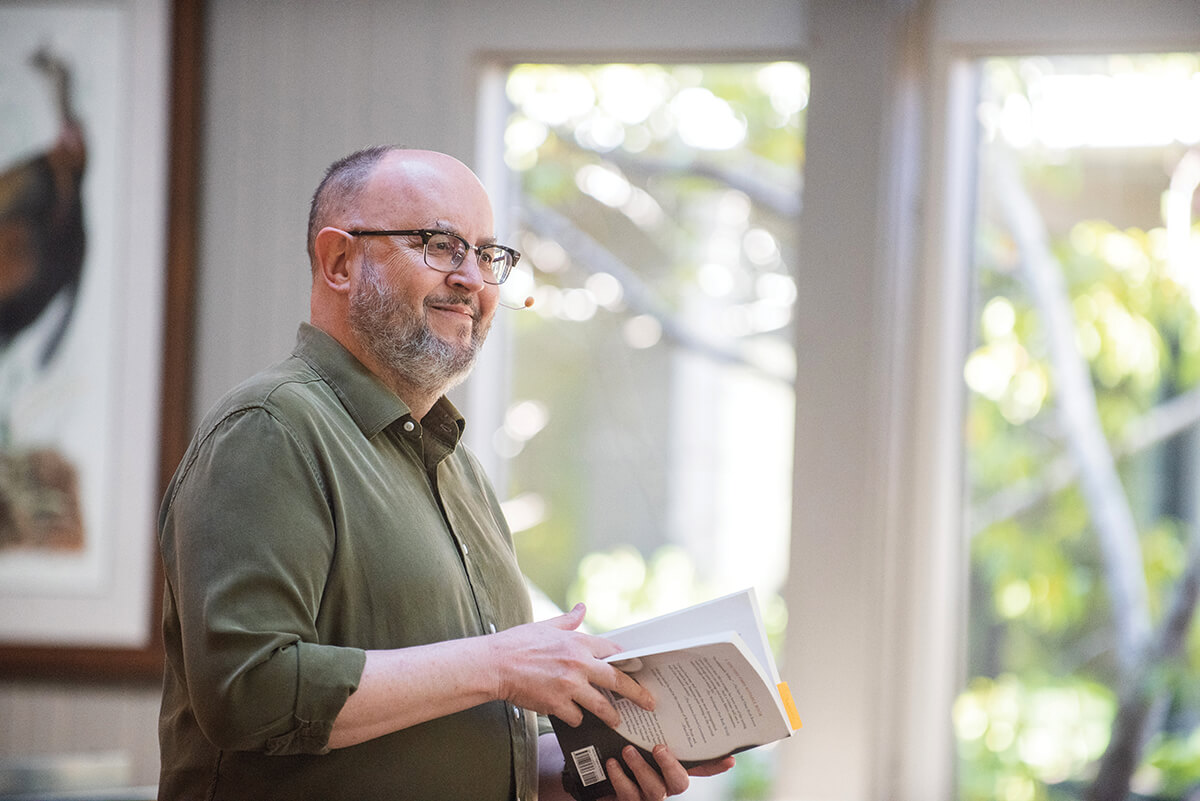
Writer, Baylor professor, and Laity Lodge speaker Alan Jacobs reflects on the intersection of place and plans when coming to the Canyon.
When I get ready to drive from my home in Waco to Laity Lodge—perhaps to lead a retreat, or perhaps just to have some time on my own—I always pack some sturdy hiking shoes, a bag of books, a notebook and pen, and a plan. It’s about a four-hour drive from my house to the Canyon. During that drive I listen to podcasts or music, but I’m always thinking about my plan—about how to make the best use of my time.
But as I turn down the dusty road that drops to the Frio, I feel that my grip on the plan is not quite as firm as it had been. As I drive through the river, the grip loosens a little more. This is troubling.
When I get to my room at the Lodge, I re-focus on my plan. I set out the books on the desk. I open the notebook and put the pen across it. But then, because I’ve been in the car for a long time, I need a walk. So, I strap on the hiking shoes and head out onto one of the trails, and as I do, with the Frio below me, the birds above me, and the cedars around me, something happens.
Gradually, and without meaning to, I start to let go of my plan. It no longer seems to matter that much. I take a deep breath of the clean air, and then another. I walk; maybe I stop and just breathe for a while.
Thus, I begin—for the first time in a long time, I perceive—to listen. And when I start to listen, God begins to speak to me … or maybe it’s better to say that when my own mental babble quietens for a moment, I realize that God has been speaking to me all along.
. . . when my own mental babble quietens for a moment, I realize that God has been speaking to me all along.
With that inner noise silenced, I hear at least some of what God would say to me. I hear it in the breezes that flow down the Canyon and in the tumbling waters. I hear it even in my own breath. I become aware that this still small Voice is available to me, if not all the time, at least much more often than I am inclined to hear it.
What that Voice gradually discloses to me is the extent to which my plans are a form of idolatry—an idolatry of self, an idolatry of me. My plans stem from a desire to control and direct and never be at the mercy of anyone or anything else—even God. And to know this is to begin to be healed.
In W. H. Auden’s wonderful sequence of poems, “Horae Canonicae”—the title refers to the daily “hours” of monastic prayer—he describes the Crucifixion of Jesus and, immediately afterwards, what happens to the people who crucified him:
… our own wronged flesh
May work undisturbed, restoring
The order we try to destroy, the rhythm
We spoil out of spite: valves close
And open exactly, glands secrete,
Vessels contract and expand
At the right moment, essential fluids
Flow to renew exhausted cells …
What happens, in short, is the work of repair. Though we have crucified the Lord of All, God’s grace to us is manifest first in the ongoing renewal of our bodies. This is not the work of a biological machine, but a pure gift. If our spirits and wills can later be healed, that’s because our bodies are repairing themselves right now.
I think that’s what happens to me in the Frio River Canyon when I start breathing that air and walking those trails.
I’ve been to Laity Lodge many times now. It always teaches me about my own self-idolatry. Laity Lodge is a place of quiet and contemplation, a place of beauty and hospitality. And it turns out that these are precisely the gifts I need in order to be released, however temporarily, from my desperate need to control my life. I repair to the Canyon to be repaired.
repair /rə’per/ verb
1 fix or mend, make good, or put right (a thing suffering from damage).
2 go to, withdraw to, or adjourn to (a place), especially in company
So when I’m there, I might read the books I brought, or I might not. It’s quite possible that I will sit in the library and read something that I hadn’t heard of, or perhaps had heard of but didn’t know I needed to read. My notebook? I might fill dozens of pages or not write a word. I never know before I drive down into the Canyon what I’m going to do—or not do, as the case may be. Every time, I pack a plan, and every time, I let go of the plan and start listening to God’s call upon my life.
No matter how diligently I strive to put my life under my own control, God loves me and seeks to direct my path. Every time I drive down into the Canyon, I am taught this lesson again—whether I plan to learn it or not.
Running a restaurant in order to reach kids is not for the faint of heart. Good thing Hubert Brown's heart is strong.
Artist and professor Dan McGregor has been drawing the flora and fauna of the Frio River Canyon for a few years. Here is his perspective on re-creating creation.
Know Your Neighbor's Third Thursdays allows guests to learn from the stories of San Antonio leaders.